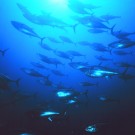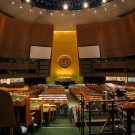Nach dem erfolgreichen Start der Veranstaltungsreihe “Ozean im Wandel: Herausforderungen für die Zukunft” am 28. Oktober 2014 mit rund 200 Zuhörern folgt am 4.11.2014 der zweite Abend der Veranstaltungsreihe “Ozean im Wandel: Herausforderungen für die Zukunft” Nur wenigen Menschen ist bewusst, wie sehr wir auf die Meere und ihre Ökosysteme mit ihrem großen Artenreichtum angewiesen […]
7 Abende über Ozean und Nachhaltigkeit
Am 28.10.2014 startet die Veranstaltungsreihe “Ozean im Wandel: Herausforderungen für die Zukunft” Nur wenigen Menschen ist bewusst, wie sehr wir auf die Meere und ihre Ökosysteme mit ihrem großen Artenreichtum angewiesen sind. Die Ozeane versorgen uns mit Nahrung und medizinischen Wirkstoffen, mit mineralischen Ressourcen, sie liefern Energie, regulieren das Klima und sind unser wichtigstes Transportmedium. […]
Standalone goal for the ocean remains uncontested in proposed UN SDGs
After the 12th session of the Open Working Group, the Co-chairs published a refined version of the Zero Draft on the proposed Sustainable Development Goals (SDGs) as they announced in a letter on 30 June 2014 . A standalone goal for the ocean remains uncontested in the most recent list of 17 proposed UN SDGs (“SDG 14: Conserve and promote […]
Jointly towards SDG Ocean and Coasts: Mission Ocean
While Future Ocean’s research group on Our Common Future Ocean focusses on ocean sustainability and policy making towards an UN Sustainable Development Goal – SDG – specifically aiming at the ocean, the issue is also at the forefront of international ocean campaining right at this moment. The Global Ocean Commission funded by Pew Charitable Trusts and […]
Papers published on sustainable development of the ocean and coasts
In two new publications, our interdisciplinary research group of ‘The Future Ocean’ around Martin Visbeck emphasizes the need for international cooperation and governance to protect the marine environment and secure blue wealth. Continuing human development and economic growth, and unrestricted access to ocean resources and global environmental changes, along with climate change, are putting enormous […]
Future Ocean Spatial Planning
“Our research aims at improving the scientific basis necessary for more sustainable development of the global future ocean. These aims include the development of a fully negotiable SDG text and a concept for Future Ocean Spatial Planning (FOSP). Therefore, we will build working groups of experts from inside the research group and including external key […]
Sustainable Coastal Development
“Nothing is static, and neither are the world’s coasts. Constantly shaped by waves and wind, and at a progressive rate by humans, coasts are facing considerable changes – and challenges. A rising demand for coastal resources, resulting alterations and interventions in the coastal zone, natural hazards, climate change and resulting effects have noticeable and often […]
The Sustainability Principle
“Since the classical definition provided by the Brundtland Commission in 1987, the term ‘sustainability’ has become the dominant Leitmotiv for shaping international environmental and developmental relations. Notwithstanding these efforts, there is still no commonly accepted definition of the term and it often remains unclear what sustainability actually means. This holds particularly true in the conservation, […]
Sustainable Fisheries
“Fisheries are a prime example of an activity that originates in the coastal environment but whose focus typically extends well into the ocean. The major impediments for sustainable fisheries are non-existent or weak management, along with poor compliance and enforcement. We need to improve scientific input and develop ocean literacy in the general public in […]
New Legal Instruments
“The international law community is trying to understand if existing international law is sufficient to reach the goal of sustainable oceans and coasts or if new legal instruments are required to fill existing or perceived gaps. A particularly challenging topic is whether governments view existing and possibly extended law as binding upon states parties or […]








